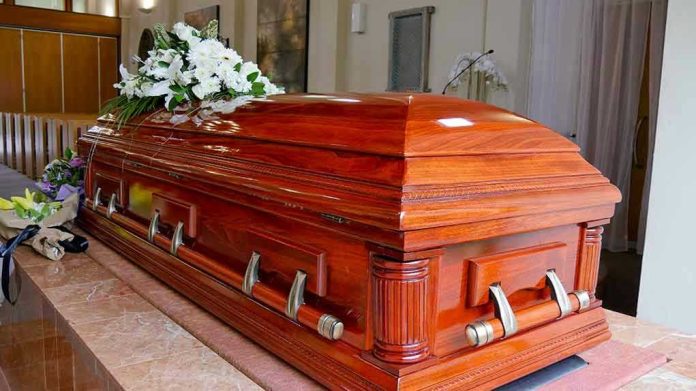
Nearly 190 bodies left to rot in a Colorado funeral home, fake ashes handed to grieving families, and a judge who flatly refused to let a plea deal sweep this nightmare under the rug—this case could reshape how America thinks about death, dignity, and justice.
Story Snapshot
- A Colorado judge rejected a plea deal for Carie Hallford, whose funeral home stored almost 190 decomposing bodies and defrauded families.
- Victims received fake ashes, and families’ outrage led to the rare judicial rejection of a negotiated sentence.
- The Hallfords also misappropriated nearly $900,000 in federal pandemic aid, compounding the scandal.
- The case has ignited demands for tougher oversight of funeral homes nationwide.
A Story of Betrayal in a Small Colorado Town
Penrose, Colorado, a rural patchwork of fields and faded storefronts, became the epicenter of a national scandal when authorities discovered nearly 190 decaying bodies stacked inside a funerary building meant to be a sanctuary for the dead. Return to Nature Funeral Home, operated by Jon and Carie Hallford, promised affordable, compassionate care but delivered a horror show. Families trusted the Hallfords with their loved ones. Instead, they received urns filled with fake ashes, a deception that deepened wounds already raw from loss.
For four years, from 2019 to 2023, bodies accumulated in an unregulated, bug-infested facility. Complaints mounted. The Hallfords’ finances deteriorated. In a desperate bid to prop up their failing business, they fraudulently secured almost $900,000 in federal pandemic aid. The final reckoning arrived in October 2023, when investigators uncovered the grim scene, exposing a pattern of abuse-of-corpse and fraud that left a scar on the community and a stain on the entire funeral industry.
The Unprecedented Legal Fallout
Legal proceedings for crimes of this magnitude are rare. Both Jon and Carie Hallford initially pleaded guilty to 191 counts of corpse abuse and federal fraud. Prosecutors struck a plea deal, recommending sentences between 15 and 20 years. But as victim impact statements poured in, describing the trauma of learning a loved one’s remains had been desecrated and their trust obliterated, the mood shifted. Families likened the plea agreement to a slap on the wrist, demanding real accountability.
Judge Eric Bentley listened—and acted. In August, he rejected Jon Hallford’s plea deal. Jon withdrew his guilty plea, preparing to face trial. Then, on November 3, 2025, Bentley rejected Carie Hallford’s plea as well, stunning legal observers and giving victims new hope that justice might be served. Now Carie faces a stark choice: withdraw her plea and risk a harsher sentence at trial, or accept the consequences without a deal on the table. The coming months will determine whether the Hallfords are held fully accountable, or whether loopholes in the justice system allow them to evade the consequences their actions so richly earned.
Victims, Justice, and the Death Industry’s Reckoning
Grieving families, already battered by loss, became crusaders for reform. Their outrage forced the court to reconsider a standard plea bargain, an almost unheard-of intervention. Their stories—of receiving ashes that were nothing but ground cement or sand, of learning their loved ones’ bodies were left to rot—galvanized the public and drew national attention to Colorado’s lax oversight of funeral homes. The Hallfords, once trusted service providers, are now pariahs. Their actions exposed gaping holes in the regulation of America’s death industry and triggered calls for urgent reform.
The consequences stretch far beyond Penrose. State and federal regulators now face calls to tighten licensing requirements, increase inspections, and impose harsher penalties on funeral homes that betray the public trust. Lawmakers, once content with minimal oversight, are under pressure to act. If the Hallfords’ case becomes a catalyst for new laws, it will be because ordinary families refused to let their trauma be ignored.
What Happens Next—And Why It Matters
The legal process grinds on. Jon Hallford heads to trial in February; Carie’s fate will be decided by late next year if she proceeds to trial herself. Both face additional federal sentencing for pandemic aid fraud, a crime that, while less visceral than corpse abuse, exemplifies the Hallfords’ brazen disregard for law and decency. For the families, closure remains distant—but their voices have already changed the story’s arc, forcing a reckoning in an industry that too often operates out of sight and out of mind.
Funeral homes handle our most sacred moments. When those charged with such trust fail, the wounds are deep and the consequences far-reaching. As the Hallford saga unfolds, the entire nation is watching not just for justice, but for signs that the system will not allow such betrayal to happen again.



